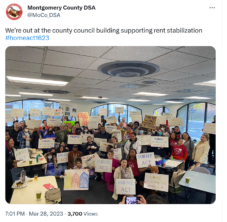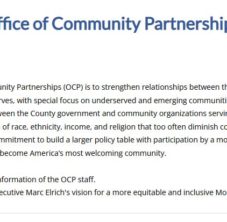I’ve been studying the “woke” (critical social justice) movement since the Evergreen State riots in 2017. I have always identified as a classic liberal, and I still do. I am self-employed, and one could easily argue that I work in the progress business; I earn more when my clients do well, less and sometimes none when they don’t. My entire adult life, “live, and let live,” would have described my politics. Until 2020.
Living in Montgomery County it became very clear that there were some who were allowed to “live,” and some who weren’t, AND, if you were one of us that weren’t preoccupied with wiping down our fruit with Clorox wipes before removing our N95’s, it was VERY clear who was allowed to “live,” and who wasn’t. “Live the way we tell you to, you don’t need to know why,” was NOT something, growing up in a deep red military baptist household, I was fond of. I was confused, I felt abandoned by my fellow liberals, and I dug deeper into researching why I was confused. Why weren’t words seeming to mean what the book in my house with dictionary on the front says they mean?
Now here we are.
This is the first part of a social justice dictionary to help you understand what those who govern us, and those who teach our children mean when they use these words. These are NOT buzzwords. Sitting behind each word like, “equity,” or, “antiracist,” is a theory to better the behavior of humans in the eyes of humanity PhD’s loaded with academic language, and a plan to inject it into society. The words themselves sound good to most good-hearted people. However, when you see the theories in practice one can begin to see how the words have been misaligned and redefined. The Webster’s dictionary definition is how the ideas win support. You are sold the promise of restoration, and you receive the very opposite.
Woke: Is an adjective to describe a person who is aware of, and has a pathological like (resembling mental illness) sensitivity to systemic oppression that philosophers in social science claim to exist in regards to race, gender, ethnicity, disability, age, etc…In academic language, a “woke” person has, “critical consciousness.” Critical consciousness claims to help a person achieve an in-depth understanding of the world, allowing for the perception and exposure of social and political problems. Critical consciousness also includes taking action against the oppressive elements in one’s life that are illuminated by that understanding. The problem with critical consciousness, or, “being woke,” is it is a permanent state of being dissatisfied. Perhaps you’ve heard the phrase, “do the work.” Or, “the work is never done.” They mean it. They will find oppression in a cup of water if you give them the chance, which means there is effectively no solution to any of the problems they claim to exist except for utter destruction.
Equity: Webster’s will tell you the definition is, “the quality of being fair and impartial.” Sounds great. How would you measure that? Enter social equity theory. In practice, equity means a policy with the aim of creating equal outcomes in performance amongst different identity groups, or, a “lens” in which to view policies to look for unequal performances between identity groups. The problem with this equity is that those that live by this worldview measure equality (equal opportunity) by looking at outcomes (equity). This means that ANY difference in performance between identity groups (if the higher performing identity group is viewed as an oppressor within the scholarship of an allied field) is because of a flawed policy; the flaw most likely to be some sort of -ism, or white supremacy. Equity and equality ARE mutually exclusive. “Equity means every one ends up in the same place.” – Kamala Harris. They’re saying it out loud, I’m not making this stuff up. You should note, equitable policies never apply when historically marginalized groups are out performing historically dominate groups. The NHL needs equitable policies, the NBA doesn’t.
Inclusion: The act of including others. We all learned this as kids. Everyone wants to create an inclusive space, and to create an inclusive space, everyone has to feel welcome. If everyone is welcome at the table, we’ll have better solutions. One problem with “inclusion” is that in order for people to feel welcome, they have to not have their feelings hurt, and in order to not have their feelings hurt, certain ideas must be excluded. This means strict speech codes (pronoun rituals, misgendering, enacting whiteness..) are enacted and enforced.
If you’re thinking, “that’s not inclusive,” you’re right. An “inclusive space,” is an exclusive space where certain ideas must not be shared. The best example of an inclusive space is our county council. Conservative, libertarian, or even moderate thoughts at this point are not welcome.
Progress: To advance or move forward. Progress is a vague word that allows what we’re actually trying to make progress in as a community open to interpretation, AND, progressives are currently measuring progress through an equity lens. This is incredibly problematic at the moment because they’ve given up on lifting up those at the bottom, and started cutting the legs out from under those at the top. Let’s say a progressive activist says they’re going to make 100% of kids in high school graduate. Great. How? Look at Oregon. They’ve suspended a graduates need to show proficiency in essential learning skills. MCPS is looking at whether or not homework is racist. Will more kids graduate High School? Maybe. Will they have learned much of anything? Probably not much more than being another critically conscious member of society, unfortunately.
Progress is in the eyes of the beholder. When someone in a position of power uses that word, one must always ask, “what are you measuring, how are you measuring it, will you quit if you fail to make progress?”
Democracy: A government by the people. The problem with this word when you hear it is that the use of the word democracy, or phrases like, “save our democracy,” do not refer to the present “government by the people,” they refer to the future. You’ll hear the words, “we need to do X to protect our democracy,” or, “Y is trying to destroy our democracy.” The key word in this sentence is, “our.” What is actually meant is “theirs,” not, “ours.” That’s because to them, democracy hasn’t happened yet, it’s an objective, or plan in progress, not a current state of being in the country. Note they NEVER say republic. In their philosophy, in order to achieve a true democracy, everyone must FIRST be made equal (equity). So when you hear them say, “X is a threat to democracy,” know that this just means, “x is a threat our plans to make every one equal, because that’s what’s necessary for us to try our true democracy.”
Far-right: “Far right” is a pejorative used to cause dismissal of those not on the far left. Steven Pinker’s concept of the “left pole,” captures this well. If you’re standing on the North Pole, everything looks like it’s coming from far south. Apply it to politics, and politically speaking, if you’re on the left pole, everything you disagree with looks like it’s coming from the the FAR right. So, someone who is branded, “far right,” objectively, is simply one who is NOT on the far left, which for actual viewpoint diversity purposes, SHOULD be good. It is a willful act of exclusion as opposed to inclusion.
Diversity: Diversity’s dictionary definition is very similar to inclusion. It simply means variety. Like inclusion, it sounds useful because a more diverse group of problem solvers should produce more diverse solutions. Unfortunately, when you hear diversity, you’re only hearing about superficial differences one could probably observe with their eyes. A group that champions diversity generally AGREES on policy issues, but have superficial differences related to their identity. They are diverse in a photo, (black, brown, male, female, trans, wheelchair), but not on a voting record. A note about diversity is that it is also exclusive. Where as with inclusion, conservative ideas need not apply, with diversity, straight white married Christian men need not apply. Again, look at the county council. Who is the straight white married Christian man? Far better yet, who is the straight Muslim man on the county council?
Antiracist: I’ve been watching the dictionary definition for this, and it is quite fluid, so all I can tell you is this. In practice, it means racist. The opposite of racist is not, “antiracist,” it is raceless. The behavior of a racist and an antiracist is identical even if the groups they’re focusing their energy on are not. Just like a racist, the antiracist cares deeply about race, and policies that affects the race they belong to. They’re both ducks, just two different types. They act like ducks, quack like ducks. They’re racists.




